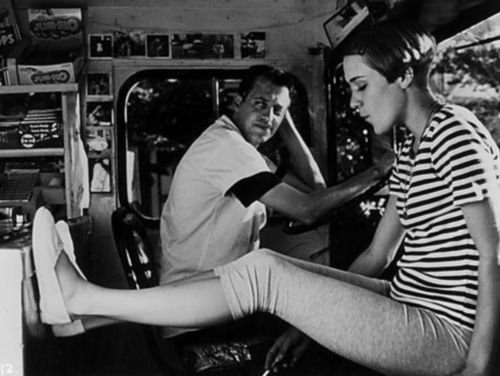As the hype surrounding The Sopranos has been rekindled in the same way as that other show from HBO’s “Golden Era,” Sex and the City, upon its twentieth anniversary, thus has one of New York’s most beloved theaters, IFC, in conjunction with Split Screens Creative Director and TV critic Matt Zoller Seitz (who also recently co-wrote The Sopranos Sessions), taken it upon themselves to create a film festival in celebration of the show’s legendary and groundbreaking cinematic presence on the small screen.
And, as both Chase and Seitz will tell you, there is perhaps no greater influence on The Sopranos–apart from Goodfellas–than Steve Buscemi’s highly autobiographical 1996 directorial debut, Trees Lounge. Though Buscemi had long been no stranger to cooking up his own productions on a shoestring budget from his early days in New York (forming an allegiance with downtown 80s fixtures like Rockets Redglare, who appears as fellow Trees Lounge regular Stan), he found that once given the full “official” reins to create something, he was at a loss for a subject matter. It was then that someone suggested that he write about his life in Valley Stream, events of which actually included him driving an ice cream truck and constantly frequenting the same dive. It was then, at the psychoanalytic hands of a screenplay, Buscemi created his onscreen foil–the version of himself that might be had he never left Long Island–Tommy Basilio, complete with quintessential “wop” last name and all.
And Tommy is, to be frank, “a loser.” After eight years of being a toxic and cheating boyfriend to Theresa (Elizabeth Bracco), she decides–perhaps somewhat vindictively–to go for his best friend and employer at the auto body shop, Rob (Anthony LaPaglia, more “stud-like” in this, surprisingly, than in Empire Records one year prior). Though Tommy is the overtly wronged one in the scenario, Rob’s anger–and subsequent firing of Tommy–over his ex-best friend stealing money from the business for a little gambling jaunt to Atlantic City makes the tension between the two particularly palpable. And gives Tommy further fuel for his daily and nightly benders at Trees Lounge, where fellow regular, Mike (Mark Boone Junior), also relishes the sweet nectar and numbing effects of his poison of choice as he deals with the potential loss of his wife, Marie (Eszter Balint), and daughter to the mistress of his alcoholism. Though he is “successful” by financial standards as a result of having his own moving company, his personal life is in the same shambles as Tommy’s, making them fast friends–or at least drinking allies. Much to the dismay of Connie (Carol Kane, forever consummate), the night shift bartender who constantly has to pry Tommy out of the bar with the jaws of life.
With the recent death of Tommy’s Uncle Al (Seymour Cassel), a void has been placed in his ice cream truck, the job of which is mentioned by none other than Christopher “Michael Imperioli” Moltisanti himself (another actor Chase would pluck from Trees Lounge for The Sopranos would also be John “Artie Bucco” Ventimiglia) while at the funeral. Because no one ever said Italian Americans weren’t victims of poor taste when it comes to mourning the dead.
In point of fact, it isn’t just actors that are poached from the film (casted by Sheila Jaffe, who would, yes, then go on to cast The Sopranos), but also the gritty cinematography, Long Island trash doppelganger to New Jersey trash and the slow yet emotionally strained shots. All of it is blatantly evident when one watches The Sopranos. The influence of Trees Lounge was so potent upon Chase’s aesthetic and narrative approach to the series that it’s no wonder Buscemi ultimately became both a character (Tony B) and a director of several episodes (including the somewhat similarly titled “Pine Barrens”). With the Trees Lounge mark pissed all over The Sopranos, it has to be said that the prototype for Meadow Soprano (Jamie-Lynn Sigler) could be none other than Theresa’s seventeen-year-old niece, Debbie (Chloë Sevigny, a requisite presence in any indie 90s movie).
With an irate and highly irritable patriarch, Jerry (Daniel Baldwin), who prefers to mock rather than understand her as a means to identify, Debbie’s daddy issues are apparent. And, in her mind, can perhaps be solved with the remedy of Tommy as he drives his ice cream truck and she chooses to jump in and play her Lolita role to perfection. Complete with 90s gamine haircut and chain cuff earring. Like Meadow, Debbie grows to fear her father at the same ratio she realizes her mother, Patty (Mimi Rogers, Tom Cruise survivor), is a frivolous woman who cares only about fulfilling her vanity–especially in middle age. With her latent suburban contempt and frustration mounting, Debbie gravitates toward the things and the men that are bad for her, à la Meadow. But more than the average composite for “a fucked up girl looking for her own peace of mind,” Debbie is a subtle blueprint for the damaged yet “let me put on a brave front” Meadow.
Of course, Tommy, too, clearly offered up plenty of flawed protagonist inspiration to Chase and his own tormented creation: Tony Soprano (James Gandolfini, RIP). For Tommy, the search for meaning beyond the bar becomes too palpable to ignore–just as it does for Tony in terms of examining the moral implications and consequences of his highly illegal profession. Tommy’s future could just as easily be that of aging barfly and shameless drunk Bill (Bronson Dudley) as Tony’s could be of his father’s, Johnny Boy Soprano (Joseph Siravo)–all narcissistic lothario and that rot. The future could tip in either direction: tragic or “corrected” before too late. Trees Lounge lets you make your own conclusions, just as David Chase did with the still oft talked about final episode of The Sopranos.
On a side note, doesn’t Debi Mazar as Crystal just reek of Drea De Matteo as Adriana La Cerva?



















